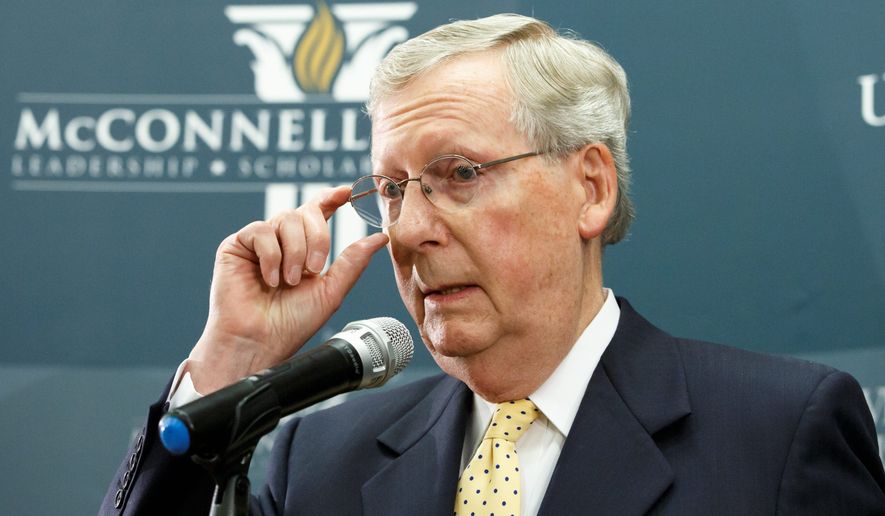Under pressure from a large faction of rank-and-file members, Senate Republican leaders are warming to the idea of keeping the rule change known as the “nuclear option” that Democrats imposed to end filibusters of nominations.
Senate Minority Leader Mitch McConnell, a Kentucky Republican who will become majority leader in January, is leaving the decision to the will of his members, and at least half of them currently oppose reversing course, said GOP aides close to the discussions.
The leadership team this week began signaling that the new rule, which reduced the number of votes needed to cut off confirmation filibusters from 60 to 51, is likely here to stay.
“My view at the time [Democrats] did it was, if this rule changes, it’s likely never to revert back to where it was,” said Missouri Sen. Roy Blunt, vice chairman of the Republican Conference.
The rule change dramatically shifted power in the Senate, ending the institution’s 200-year tradition of granting substantial power to the minority party. The new rule eliminated the minority’s sway over nominations and all but assured that a president whose party holds the Senate majority would get nominees easily confirmed.
Sen. Orrin G. Hatch, Utah Republican, has emerged as the most outspoken proponent of using the new rule to the GOP’s advantage.
“We should not return to the old rule. We should teach those blunderheads that they made a big mistake,” Mr. Hatch said in a speech last week to The Federalist Society. “Frankly, I intend to win with our candidate for the presidency in 2016, and we will give them a taste of their own medicine.”
His views are popular among Senate Republicans, who also insist that Democrats can’t be trusted not to go nuclear again if they win back majority control of the chamber.
“A majority of the caucus understands the nature of the beast,” said a senior GOP Senate aide. “The hardest part about doing the nuclear option was doing it in the first place. They [Democrats] did it once when they had the power, and they will do it again when they have the power again.”
Mr. McConnell fought fiercely to stop Senate Majority Leader Harry Reid, Nevada Democrat, when he set off the rule change in November 2013.
Denouncing the move as a “power grab,” Mr. McConnell vowed that Republicans would undo the nuclear option if they won the majority in this year’s midterm elections. “The solution to this problem is at the ballot box,” he said at the time.
Mr. Reid defended the move as a last resort to save the Senate, which he said was mired in endless Republican filibusters of Mr. Obama’s nominations.
“We’re burning wasted hours and wasted days between filibusters,” he said. “It’s time to change the Senate before this institution becomes obsolete.”
Mr. McConnell also pledged to break with Mr. Reid’s dictatorial control of the chamber and restore regular order, allowing more votes on amendments, bringing more bills to the floor and giving rank-and-file members more say in Senate proceedings. His pursuit of a more open process, however, prevents him from strong-arming Republican senators to give up the nuclear option, according to Capitol Hill insiders familiar with his thinking.
Some Republicans are pushing for a return to the old rule, but their numbers so far are not enough to convince the leadership.
Sen. Lindsey Graham, South Carolina Republican, argued that reversing the nuclear option would make it more difficult for Democrats to confirm President Obama’s nominees.
“If you get a Republican president, then we’ll see what Democrats do on their watch. But the next two years, I think, [it is] in our self-interest to make it harder to get people into the judiciary and executive branch, not easier,” he said on the Hugh Hewitt radio show.
Republicans also are under pressure from conservative groups that want to keep the new rule to help future GOP presidents install “committed constitutionalists” to the federal bench.
“We see very little upside and significant downside in reviving the judicial filibuster,” a group of 26 conservative leaders, including American Values President Gary L. Bauer and anti-abortion Susan B. Anthony List President Marjorie Dannenfelser, said in a letter to Senate Republicans.
For the time being, the leadership has little incentive to change anything or even announce a decision.
Senate Minority Whip John Cornyn, who will become deputy majority leader next year, said that the conference has plenty of time to decide wether to stay nuclear.
“To some extent it is kind of a moot issue for the next two years, because we control the nominations process in the committee and we control the process on the floor, so there’s plenty of leverage short of the nuclear option that we can use to influence the nomination process,” said Mr. Cornyn, Texas Republican.
• S.A. Miller can be reached at smiller@washingtontimes.com.




Please read our comment policy before commenting.